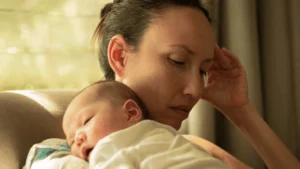Introduction
Postpartum depression and psychosis are two mental health conditions that can affect women after giving birth. While they share some similarities, they also have distinct differences in terms of symptoms, risk factors, and causes. Understanding these differences and similarities is crucial for identifying and addressing these conditions effectively, ensuring the well-being of both mother and baby.

Overview
Postpartum depression is a mood disorder that can occur in women after childbirth. It is characterized by feelings of sadness, hopelessness, and a loss of interest in activities. Women with postpartum depression may also experience changes in appetite, sleep disturbances, fatigue, and difficulties in bonding with their baby. These symptoms typically appear within a few weeks to a month after delivery and can last for several months or even longer if left untreated.
Symptoms of postpartum depression
- Feelings of sadness, emptiness, or hopelessness
- Lack of energy and fatigue
- Changes in appetite and sleep patterns
- Difficulty bonding with the baby
- Loss of interest in activities
Symptoms of psychosis
Postpartum psychosis, on the other hand, is a rare and severe mental illness that usually occurs within the first few weeks after childbirth. It is a medical emergency that requires immediate attention, as it can lead to delusions, hallucinations, and frantic or disorganized behavior. Women experiencing psychosis may also have thoughts of harming themselves or their baby. Other symptoms include confusion, extreme agitation or restlessness, and rapid mood swings.
Symptoms of psychosis
- Delusions or intense irrational thoughts
- Hallucinations or seeing things that are not there
- Disorganized behavior
- Extreme agitation or restlessness
- Thoughts of harming oneself or the baby
Similarities
While postpartum depression and psychosis have distinct differences, there are also some similarities between the two conditions. Both can occur shortly after childbirth and affect a woman’s ability to care for herself and her baby. Additionally, both conditions can negatively impact the mother-infant bond, leading to difficulties in establishing and maintaining healthy attachment.
Risk factors
Several risk factors increase the likelihood of developing postpartum depression or psychosis. These include a history of mental health disorders, particularly depression or bipolar disorder, a family history of mental illness, stressful life events, lack of support, and hormonal changes during pregnancy and after childbirth. Additionally, women who have experienced previous episodes of either postpartum depression or psychosis are at a higher risk of recurrence.
Causes
The exact causes of postpartum depression and psychosis are not fully understood. However, hormonal changes that occur during and after pregnancy play a significant role. Fluctuations in hormone levels, along with genetic, psychological, and environmental factors, are believed to contribute to the development of these conditions. There may also be a complex interaction between these factors that varies from woman to woman.
Preventions
While it is not always possible to prevent postpartum depression or psychosis, there are steps that women can take to reduce their risk. These include seeking support from partners, family members, and friends, ensuring adequate rest and self-care, attending prenatal and postpartum check-ups, and being open and honest about their feelings and emotions. Additionally, healthcare providers can play a crucial role in screening for and identifying at-risk women, providing early intervention and support.
Summary
In summary, postpartum depression and psychosis are two mental health conditions that can occur in women after childbirth. While postpartum depression involves feelings of sadness, disinterest, and a difficulty in bonding with the baby, postpartum psychosis is more severe, involving delusions, hallucinations, and thoughts of harm. Both conditions can have a significant impact on the mother-infant bond and require proper diagnosis and treatment. Identifying risk factors and taking preventive measures can help promote the mental well-being of women during the postpartum period.